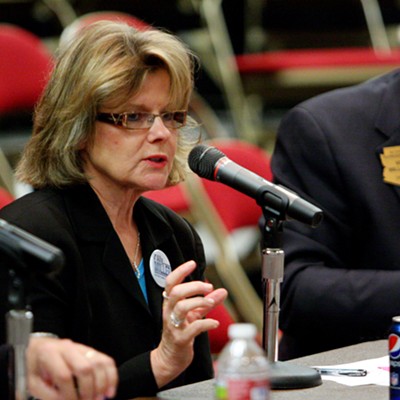Smokers who work for Pima County got a break from higher insurance rates this year—but they could be facing steeper co-pays in the future.
The Pima County Board of Supervisors voted 4-1 Tuesday, Feb. 17, to increase insurance rates for tobacco users, but said the increased fees would be waived as long as workers took a smoking cessation course. And because the board mandated that all Pima County smokers take the cessation class, they essentially waived the fees for all smokers.
Supervisor Ray Carroll voted against the proposal, saying it was "too convoluted."
"I don't go for that stuff," Carroll said.
The board also rejected a proposal from Pima County Administrator Chuck Huckelberry that would ban the county from hiring smokers altogether.
The vote came after supervisors wrestled with the challenges of testing whether someone was a smoker and argued about whether they were headed down a slippery slope toward discriminating against the overweight.
Supervisor Richard Elias was the most vociferous in his opposition. A smoker himself, Elias conceded the habit was "deplorable" and he supported encouraging employees to take cessation programs to the help them quit, but he didn't believe the additional health-insurance costs related to smokers constituted a "crisis."
"What are we doing to?" Elias asked. "Stop employing people who are overweight? I admit, I smoke, but I like potato chips, too. They are not good for me and they give me a little bit of a paunch. So potato chips could be the enemy, too."
Elias added he thought banning the hiring of smoking would make Pima County "way out of touch with what is appropriate for county government."
And he mocked the county's proposed enforcement of the rules.
"Are we going to go around smelling people?" he asked.
Supervisor Ramon Valadez agreed that the suggested enforcement strategies did not seem appealing to him.
"I don't want to smell you, Supervisor Elias," Valadez said.
"You're not the only one," Elias responded.
But Valadez backed Huckelberry's view that non-smokers—who make up about two-thirds of the county's insured workforce—were subsidizing smokers' higher health costs to the county's plan.
"There's an issue of fairness in that regard," Valadez said. "They use more. The question is, should they pay more? I think there should be a differential."
The supervisors eventually settled on a compromise: They agreed to charge smokers a $30-per-pay-period surcharge on their health insurance cost beginning July 1, but agreed to waive the fee as long as tobacco users agreed to take a smoking cessation course. At the same time, they made the cessation course mandatory, so nobody would have to pay the surcharge in the upcoming fiscal year.
The new policy left a lot of unanswered questions for Service Employees International Union rep Maya Castillo. Would the mandated smoking classes be part of the employees' work hours or would they have to attend in their free time? Would employees have to self-report themselves as smokers?
"We'll have to see how exactly the county requires employees to do this thing," Castillo said. "Obviously, if the employer requires employees to do something, there are definite issues around pay. There are a lot of issues around implementation."
The proposal passed by the supervisors includes more increases in the tobacco surcharge over time. In the '15-'16 fiscal year, the costs jump to an additional $40 per pay period. It would increase by $10 annually until maxing at $60 per pay period.
In establishing new fees for smokers, the county is following the lead of private-sector businesses, which have adopted the surcharges in recent years.
Besides the tobacco issue, Huckelberry is also proposing to move employees onto the county's high-deductible health insurance plan rather than the alternative Preferred Provider Organization that about one-third of the county workforce uses because the high-deductible plan is cheaper for the county. Huckelberry has proposed retiring the PPO plan by fiscal year '16-'17.
Valadez said last week's compromise deals with smokers for the next year, but supervisors would be back to the issue next spring when they start work on next year's budget.
"We chose to go with a softer, educational approach this year," Valadez said. "That may change going forward. We're trying to give people a chance."
















